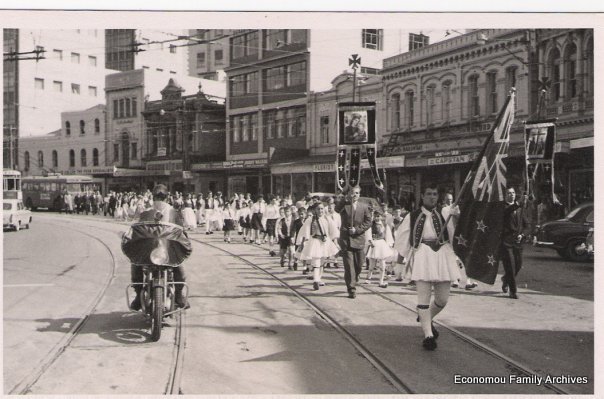ΚΑΤΣΕΤΕ ΝΑ ΣΑΣ ΒΑΛΩ ΝΑ ΦΑΤΕ!
This post is dedicated to Theia Chryssoula Razos and all those wonderful women (and some men) in our Global Greek World, with their devotion to their families and their well-being, their innate sense of hospitality or filoxenia, and their love of tradition.
Katsete na sas valo na fate... is a familiar phrase to all of us, a phrase which embodies the very essence of Greek hospitality, and very appropriately indeed, is the title of Theia Chryssoula's Cookbook of recipes from Ithaka and the world!
Remember trying to escape with a polite, no thanks, όχι ευχαριστώ, when faced with a determined mother or aunt who said this to us. Instead we got Φάτε! and promptly sat down to eat the good, traditional, home cooked dishes they specialised in...
Remember how much our non-Greek friends loved our parents' Greek hospitality along with each tasty morsel of our mothers' pastitsio, moussaka or kourambiedes?
Well, these are the recipes that Theia Chryssoula as she likes to be called,( a term of fond respect that we are all familiar with, and used for all those who were close to us) has provided us with in her cookbook.
Born in Ithaka in 1929 to Evangeloula Giannoutsos and Michael Grivas, in 1948, at the tender age of 19, she left her beautiful island of Ithaka in the Ionian Sea, in a post war ravaged and politically divided Greece, and set out on her own personal odyssey to the other side of the world, to an island nation in the Pacific, New Zealand, where her husband-to-be Theofanis Razos awaited his beautiful Greek bride...
It wasn't always easy...
Like many of the other Greek families who had migrated to New Zealand,the Boulieris family, the Gerondis family, the Karantze family or the Zavos family, the Razos family ran a restaurant. It was exhausting work but it was an occupation where the major drawcard was that, apart from the set-up capital, it required just a basic knowledge of the English language. Like all food businesses all over the world whether it is in Geneva or New York, Athens or London - migrants are able start up their own food businesses, from fish and chip shops to souvlaki stalls, from coffee shops to gyro stands, simply because they can start up having only the basic language skills and the capital, of course!
In 1958, after 10 years of what was a very different kind of life in New Zealand but one they would remember with great affection, Theia Chryssoula and Theofanis Razos took their little family and set off on the return journey to the land of their birth, back to Greece, back to their very own Ithaka...
Once back home, Theia Chryssoula, a dynamic, engaging woman but traditional at the same time, along with her ongoing commitments to family, spent most of her spare time and effort helping the island she loves so much.
Very tied to the rich history, traditions and culture of her island, Theia Chryssoula became actively involved with the cultural and community activities of her beloved Ithaka,
- as a founding member and President for seven years of Ithaka's Rural and Industrial Cooperative (Πρότυπο Αγροτοβιομηχανικού Συνεταιτισμού Ιθάκης),
- as a member of various cultural groups such as Ithaka's Public Benefit Group (Κοινοφελές Όμιλο Ιθάκης), 'Penelope's Loom' - the Handcraft Cooperative named after Odysseus' faithful wife (Συνεταιρισμός Χειροτεχνίας Αργαλειό της Πηνελόπης), and
- as President of the Ithaka Women's Organisation 'Penelope'.
Other activities include organising Ithaka's Carnival (1960 - 1980) and Ithaka's Folklore Museum as well as gathering material for the museum's exhibits.
In 1997 she helped organise a theatrical production 'Η Πούλια κι ο Αυγερινός γίνονται νύμφη και γαμπρός' which showcased the traditions of the Ithaka wedding rituals and celebrations.
Theia Chryssoula has gathered all her recipes together to create a fascinating cookbook which she has dedicated to her grandchildren and great grandchildren!
Her book is full of great recipes! Recipes from her mother, her godmother, other relatives and friends, traditional Ithakan recipes, recipes from New Zealand and other countries of the world. Recipes from when she was a young woman learning to cook, recipes which are tried and true...
We particularly loved the recipes for Kastanotourta (Chestnut cake), Butterfly Cakes and Prasopita (Leek Pie)
as well as her recipe for the steak and kidney pie that used to be made in her husband's restaurant in New Zealand.
Theia Chryssoula has put a little bit of everything into this cookbook, but above all she has put in a lot of what we Greeks call 'meraki', and love, and that's what she wants from us, her readers, as she tell us at the beginning of her book:
Thank you Theia Chryssoula for these wonderful recipes, your labour of love! We will definitely think of you with love and affection each time we cook one of your dishes, and we will be sure to drink a toast to your health...
Στην υγειά σας, Θεία Χρυσούλα!! Να είσαστε πάντα καλά!
Theia Chryssoula's cookbook is written in Greek and is available for purchase from the bookstores Eleftheroudakis and Papasotiriou or by sending an email to the Design Shop.
We recommend it wholeheartedly!







